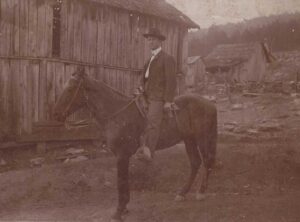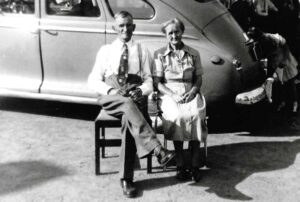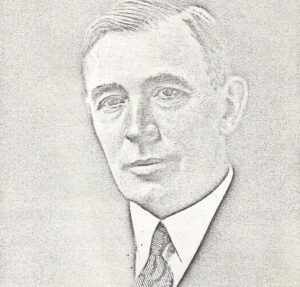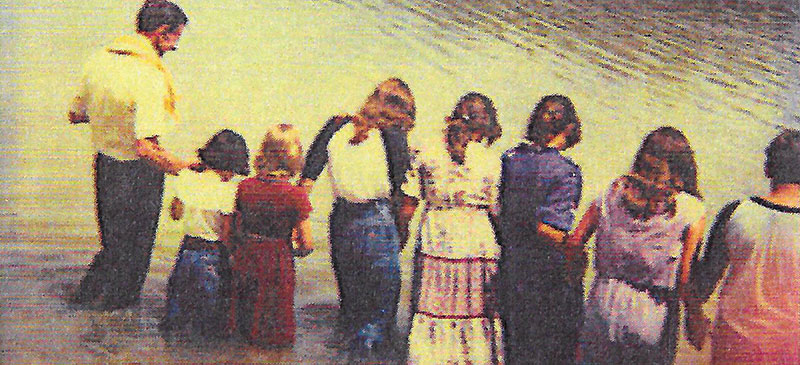
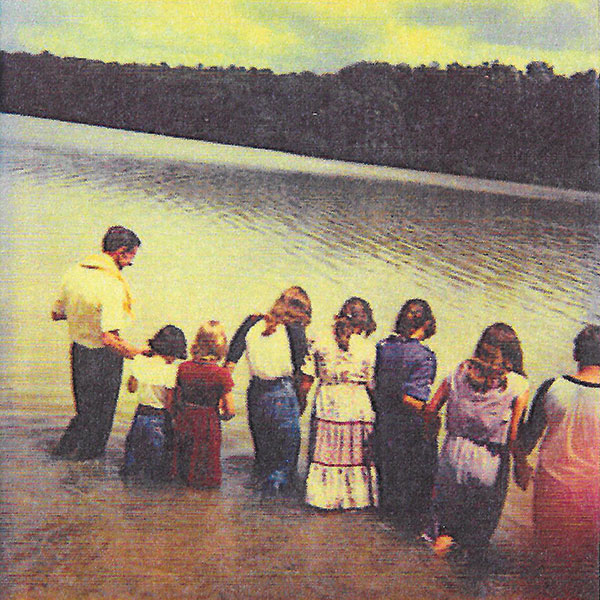
Mt. Lebanon First Congregational Methodist Church
Story by Joe Whitten
Submitted photos
Pioneers settling here were generally people of the Christian faith, and very soon they formed churches. First Baptist Springville (1817) and Ashville United Methodist (1818) are documented as over 200 years old.
Two hundred years ago, St. Clair County’s forested mountains and lush valleys had welcomed a number of pioneer families into its boundaries. Early written accounts record that these hearty settlers established homes among the Native Americans who populated the area until their removal by President Andrew Jackson.
But oral history speaks of an older one. In the 1975 Some Early Alabama Churches, published by The Alabama Society Daughters of the American Revolution, is found written about today’s Macedonia Baptist in Ragland, “… this church is said to be the oldest church in St. Clair County, and it is thought [that] it was organized in 1812.” However, it gives no source for this date, and so far, none has been found. One hopes that someday an old diary or family Bible might establish the correct date of this church. Presbyterian churches appeared later in the 19th century, and as the century progressed, populations increased, and churches sprang up throughout St. Clair County. Several of these will turn 200 years old in a few years, and many have celebrated over 100 years of existence.
One of the loveliest places in St. Clair is Chandler Mountain’s high plateau, which extends about 10 miles in northwest St. Clair County. Today it is the county’s garden spot, but it lay a wooded wilderness when Joel Chandler settled at its base in the early 1800s. Oral history states that hunters had a trail up the mountain near Chandler’s home, and it came to be called Chandler’s Mountain. Over time, the apostrophe “s” dropped off, and we have today’s name.
Vivian Qualls, in her History of Steele Alabama, records that in 1855 Cicero Johnson was the first brave soul to forge his way up the mountain to settle. Gradually, other settlers followed, but it wasn’t until 1905 that the first church was established there. However, community worship and revivals occurred before 1905, for people of faith have always worshiped together in some fashion even when denominational churches had not organized. Established churches existed at the foot of the mountain, but getting there wasn’t easy, for the trip would have been by foot, horseback or wagon down a mountain trail. Like any early settlement community, believers met together in homes to worship as often they could.
One of the early settlers, Hezekiah McWaters, was a Methodist preacher, and Mrs. Qualls writes that he preached and conducted revivals in Greasy Cove at the foot of the mountain.
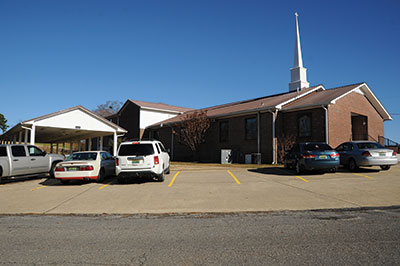
The roots of today’s Mt. Lebanon rest solidly in Ellijay, Ga., for a large percentage of early Chandler Mountain settlers came from there. Among those were the Robinson brothers, Bob, Jake and Dan. It was through the influence of this family that the mountain’s first church came into being.
Another Robinson brother, William J., a Congregational minister, would travel from Ellijay to Chandler and conduct revivals. It was a big event when William visited, and the collective Robinson families would attend his revival services. As a result of the 1905 revival, Mt. Lebanon Congregational Church organized with 11 charter members: William Robinson, J.J. Robinson, Elvina Robinson, Daniel Robinson, Elizabeth Robinson, Della Robinson, J.B. “Bent” Engle, Lucy Engle, Hettie Hyatt, Delia Wood and Ollie Engle Wood. Bent Engle sold the church two acres on which to build a sanctuary. Cost? $4.
William Robinson served as the first pastor of Mt. Lebanon from 1905-1911. He moved from the mountain, but in 1912, he returned to preach the revival services, and during that revival fell ill and died. His remains were interred in the cemetery across the road from Mt. Lebanon church.
The Congregational Church came to America through the English Puritans who suffered persecution for their non-Anglican doctrines. Coming to America, the Puritans established in 1620 the Parish Church, Plymouth, Mass., as the first Congregational Church in America. By 1640, 18 churches had been established in Massachusetts.
Jonathan Edwards, considered America’s greatest theologian, pastored a Congregation church when he preached the sermon, “Sinners in the Hands of an Angry God.” A sermon documented as having a profound effect during the 18th century revival movement known as the First Great Awaking.
We don’t know who brought the Congregational Church to Ellijay, but we do know that members of that denomination moved to Chandler Mountain and organized Mt. Lebanon Congregational Church.
Mt. Lebanon’s name has changed more than once over the years as the original Congregational denomination became less traditionally biblical in their theology. In the 1970s, the denomination’s name changed to United Church of Christ, which changed the meaning of “congregational” church. Therefore, on Oct. 24, 1981, Mt. Lebanon held a conference to discuss membership in the First Congregational Methodist denomination. A month later, the church voted to make the change, and on Dec. 18, 1981, Lebanon was accepted to full membership. Today, the church’s name is Mt. Lebanon First Congregational Methodist Church. The denomination’s headquarters is in Boaz.
Early minutes record interesting history. In the November 1928 business meeting, offerings received from members totaled $28.44. After paying National Conference dues and other expenses, $6.95 was “cash turned over to church treasurer.”
From August 1947 a penciled note in the record books states that it was a wonderful year with nearly “100 conversions. Mary (Ma) Smith said, ‘the whole of Chandler Mountain got saved.’”
Unlike the United Methodist, the First Congregational Methodist local church owns its own property, chooses its pastors, baptizes by emersion and oversees itself rather than being presided over by bishops.
The church records contain the names of all who have served as pastors. The pastor who served from 1933 to 1936, Annie Moats, is of interest, for women pastors were not approved by most churches in those days. According to Mt. Lebanon’s history booklet, Annie and Alley Mathis “Mac” Moats came to Chandler Mountain in the early 1930s. Of German ancestry, Annie Struckmeyer Moats was an ordained Congregational minister. Having pastored churches in Cullman and Lawrence counties, she met and married Mac Moats in one of those counties. Annie died in 1937 and was buried in the Mt. Lebanon Cemetery. The Moats’ granddaughter, Barbara Robinson, was a member of Mt. Lebanon from 1959 until her death on April 13, 2019, age 92. Barbara’s husband, C.L., was a church member from 1948 until his death on Sept. 27, 2018, age 91, and served as a deacon until his death. He was a direct descendant of charter member Dan Robinson.
In the 1940s, Mt. Lebanon replaced the original wooden church with one of cement blocks painted white. This building had a covered porch at the entrance and three new Sunday school rooms at the back. These rooms were fitted with doors that folded so the space could also be used as a fellowship hall.
As years passed, the block church was bricked and a steeple added in the mid-1980s. Around 1989, the church added a Fellowship Hall and in the 1990s installed a baptistry in the sanctuary and added more restrooms and a pastor’s study. The 2000s saw the inside of the sanctuary refurbished with new drywall, carpet and lighting in time for the 100th anniversary in 2005.
Prior to the baptistry being added, Susan Kell remembers when the church baptized converts in the creek and later in Chandler Mountain Lake. Karen Beasley recalls being baptized in the lake. “I was baptized in Chandler Mountain Lake by Carl Gaskin and Wayne Deweese. It was so funny, because my sister-in-law, Faye Beasley, was being baptized the same day, and her dog went out into the lake, and we couldn’t get that dog to go back, and the preachers finally said, ‘Well, just let him come on out.’ And they went ahead with the baptizing.”
However, a building with all conveniences is not the church; the individual members and the pastor who shepherds them are the church. So it has been with Mt. Lebanon, and it has flourished through the years because of the members’ faithfulness in serving God and in nurturing family and friends.
Caring for one another
The story is told of a teenage couple who wed and started married life in relative’s home. This did not work out and the adolescent couple suddenly found themselves without a place to live. Needing work, the husband went to a member of Mt. Lebanon, told him his predicament, asked, “Could I farm with you?”
This godly farmer and his wife took the couple under their compassionate wings and provided the help needed. The farmer is now in Heaven, but not forgotten, for the young man learned to farm well and successfully. Recently, he saw the farmer’s widow and told her, “Your family has meant a lot to me. Your husband put me on my first tractor, and told me, ‘Farm.’”
Yearly events at Mt. Lebanon include the Easter Sunrise Service; Homecoming every fourth Sunday in May; Women’s Conference in August; an October Fall Festival with soup, chili and desserts; then in December, participation in Franklin Graham’s international Samaritan’s Purse ministry, a Christmas program, and a fellowship meal. Of the Easter Sunrise Service, Susan Kell said, “That is a beautiful service. It’s outside, right on the bluff overlooking the distance.”
Many of Mt. Lebanon’s activities and events occur in cooperation with Chandler Mt. Baptist and churches in the valley. Karen Beasley told of the October Trunk-or-Treat event. “Our men always come together and cook the hotdogs — we do 700 — and everybody helps wrap hotdogs. This event is sponsored by all the area churches donating and working together.” No hotdogs remain when the fun night ends.
Youth Night includes all churches. “We have Youth Service,” Karen said, “where we do a community Youth Night with all the local churches — Ashville First Baptist, Chandler Mt. Baptist, Steele Baptist, Deerman’s Chapel and Reeves Grove. We do that on nearly every fourth Sunday night. The churches rotate. Susan’s grandson, Garrett Spears, played the guitar at our last one at Chandler Mt. Baptist.”
Four churches work together to prepare Backpack Buddies. This local mission outreach provides nutritious food for families who need help in providing for their families.
A nursing home visit each month is another local mission’s outreach. “We go to the Attalla nursing home and Gadsden Healthcare,” Susan Kell said. “Brother Alvin Turner, our pastor, brings a short sermon, and the residents enjoy that spiritual contact — even the staff enjoys it. Our choir members who are not working also go. We take a keyboard with us. The lady who plays it is in her 80s, but you’d not know it. Afterwards, we go out to lunch.”
Mt. Lebanon has international missions outreach as well. For several years, the church has partnered with New Desire Christian Ministries Church and Mission in La Ermita, Honduras.
Bro. Alvin Turner has pastored Mt. Lebanon for 16 years, which is a testimony to his ministry considering the fact that some churches change ministers often. In an interview, he said that growth in numbers is good if it is connected with spiritual growth. His heartfelt desire is for the church members to continue to grow spiritually as the years progress.
In speaking of Mt. Lebanon’s missions’ work, Bro. Alvin’s voice revealed the excitement. “Going on a mission trip will change your life.” He feels blessed to have made several mission trips, for the church has worked a number of years in Honduras at La Ermita with a mission and a church owned and run by New Desire Christian Ministries. Mt. Lebanon has helped support them financially and physically with constructing buildings there. By returning year after year to the same place, the church has built a relationship with the community. Bro. Turner sees these mission trips as obeying God’s command to “go into all the world” and share the Gospel.
Current Mt. Lebanon deacons are Josh Kell, Jerrell Jordan, Jason Ballard, Steve Bryant, Eddie Beasley and Johnny Beasley. Bro. Alvin said that he and the deacons “have a wonderful relationship” working together in the church. Brothers, Eddie and Johnny Beasley, are descended from early Chandler Mountain settler Bob Robinson.
For the music of the church, Sandra Dobbins, pianist, and Bro. Alvin, choir director, work together in selecting congregational songs and choir specials.
When asked about the church’s senior member, Frances Kell, Bro. Alvin spoke of her as “an amazing lady” who is a godly influence in the church and community. He also spoke of Frances’ husband, Ernest, and of his work in the church, recalling that “he didn’t like to spend money.” And that’s a good thing since a church is using God’s money given by its members.
When asked about church members who are or were influential in the church, Karen Beasley and Susan Kell both responded with these names: Aunt Margaret Fore, Ernest Kell and Wayne Deweese. Both ladies talked of Deweese, telling how people used to walk to Mt. Lebanon, and “… you’d see them coming through the fields and hear the most beautiful singing as they sang all the way to church.” Ernest Kell’s widow, 94-year-old Frances, is a sustaining influence in the church today.
Of Ernest Kell, Susan said, “My father-in-law, Ernest, remembered coming from Ellijay to the mountain in a wagon. He said he walked a lot of the way, but when it would rain, he would get up in the wagon, and his mother would cover him with her long dress. He said somebody had been here and came back to Ellijay and said, ‘That’s where we need to go; there’s all sorts of farmland.’ He was 12 years old.”
An autumn drive up the mountain with the sunshine making a stained-glass canopy of arching multi-colored trees ended at Frances Kell’s home. Although in her 90s, she remains more active than many folks who are years younger. She drives herself to church and Steele Nutrition Center during the day, but confides, “I don’t drive at night.”
She and Ernest married right after he came home from World War II and settled in to farming, first growing cotton and then tomatoes. She recalled the early freeze of 1948 that caused enormous loss to the farmers. “We were picking tomatoes in that field right over there, and somebody said, ‘We’d better turn our buckets over, it’s gonna snow tonight.’ We turned the buckets over, but we didn’t think it would. But boy did it come a big one.” Interestingly she did not mention the financial loss, which gives evidence of faith and courage in the face of adversity.
She spoke lovingly of her church and workers there, mentioning Margaret Fore as having taught the Kell children in Sunday school. She told how Ernest had been a deacon, a Sunday school teacher and the song leader for many years. “He attended those old-timey singing schools,” she recalled, “and he really learned music. I went, but I didn’t learn it. When he was getting to where he’d forget which verse he should be on — that problem had started to set in — they were trying to decide on a new song leader. They talked to one they were interested in, and when they asked what he’d charge, he said, ‘Why, I’ll not charge you anything.’ And Ernest spoke up and said, ‘That’s your man!’” Declining in some ways, perhaps, but he was still thrifty with church monies. That was Ernest Kell.
Revivals, fellowship kindle memories
When asked if she remembered any special church event, she told of a revival conducted by Bro. Bean. “He tried to bring it to a close three times, and it kept going — went on for three weeks. People were going to the altar and getting saved. That was the revival that Ma (Mary) Smith said, ‘Everybody on the mountain got saved.’ And all of her family did get saved, and they were grown men. People prayed back then,” she said thoughtfully.
Every church-going person knows funny things sometimes happen in church meetings, and Frances’ memories go down this path. “People would shout back then,” she said. “Bellie Hyatt was shouting in a service one day, and she looked out the window and saw their mules had got loose from the wagon. She stopped shouting long enough to tell her husband, ‘Quinten, the mules are loose!,’ then went back to shouting.”
Another memory came to mind. “Aunt Mollie Barnes shouted, too. She had long hair that she rolled up in a knot on the back of her head, like women did back then. She’d get to shouting and her hair would shake loose, and bobby pins would go flying. Joe, her husband, would come behind her picking up the pins off the floor and give them to her when her shouting was over.”
The subject of church fellowship dinners came up, and when asked what special dishes she took, she replied, “I usually take cakes. I used to take different ones, but now they like for me to bring my strawberry cake.” This cake is famous at Mt. Lebanon for it is Frances’ own recipe. “My husband’s favorite cake was coconut — you know, the old-fashioned kind with seven-minute icing. Well, one year we had so many strawberries that I wondered why I couldn’t use strawberries and sugar instead of coconut and sugar for the icing. So, I tried it, and they loved it.
“I have a friend who’s been bedridden for years, and he loves that cake. So, I made him one for his birthday. I enjoy doing that for people.” Frances may never have given thought to this, but she has a ministry of baking that is as useful in God’s work as any other area of service. Recently on the PBS The Great British Baking Show, a contestant said this of her cooking: “When I cook for family and friends I mix in love. If I’m kneading dough, I knead in love; if I’m mixing cake batter, I mix in love. I bake with love.” That seems to describe Frances Kell’s method as well.
When Frances’ great grandson, William “Will” Kell Spears, was asked what he loved about his great-grandmother’s cooking, he said, “Her biscuits! Nobody can make biscuits like she does. I’ve tried and mother has tried, but we can’t make them as good.” When Frances heard this, she laughed and said, “They just don’t try often enough. I’ve been making ‘em a long time.”
Will Spears is a sophomore at the University of Mobile majoring in Special Education, and he bears the hallmarks of a godly heritage received from great-grandparents, grandparents, parents and church. At age 12, he went on his first mission trip to Honduras, and has returned seven more times. In January 2019, he wrote in an online article, “I truly have no words to describe how grateful I am that God has allowed me to be a part of New Desire Honduras from the very beginning, and has allowed me to experience His presence at work. … This ministry … has challenged me to grow in my faith, to love more, to listen and trust God’s will for my life, and to know that we serve a God who is good and can make even the worst of situations display His majesty and sovereignty over our lives.”
Of Will’s 2018 trip to Africa, Will told in an interview, “My Trip to Kenya changed me in ways I could have never imagined. I went on this trip to serve, love and share the Gospel with the people in a large village outside of Nairobi. I didn’t expect, however, to be taught so much myself, about God’s love, His faithfulness, and what true worship looks like from the amazing people I met there. … It truly rocked my world. Join me in praying for the believers in Africa, Honduras and America, and know that we are all called to make disciples, whether it be across the sea or across the street.”
Near the end of his Honduras article, Will wrote, “The people who make up the New Desire Christian Church are some of the most loving people you will ever meet in this world.” These words seem to describe Mt. Lebanon First Congregational Methodist Church as well. You’d be welcomed to worship with them on a Sunday or to join them for Bible study on Wednesday evening.
Try to visit on a day when they’re having fellowship lunch afterwards and Frances Kell is there with her famous strawberry cake. You’ll find food for both soul and body at this historic St. Clair County church.
















